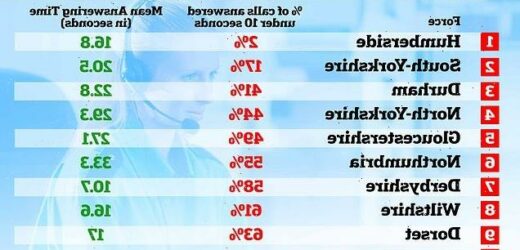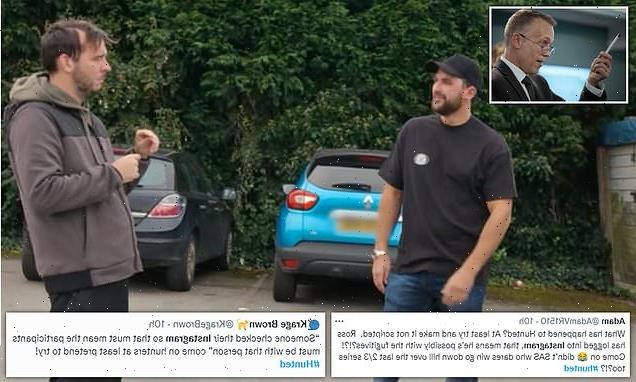‘Life and death’ 999 callers left waiting on the line as phone operators WFH: Outrage as just ONE police force hits critical 10 second target to pick up
- New data from the Home Office shows how quickly forces picked up 999 calls
- Under national targets, forces must answer 90% of 999 calls in under 10 seconds
- But the new figures show only Avon and Somerset met this target in six months
- Humberside Police answered just 2 per cent of 999 calls within the target time
Millions of Britons making ‘life and death’ 999 calls to police have been left waiting more than 10 seconds for an answer, shock new figures have today revealed.
New data from the Home Office has revealed how forces across England and Wales have been routinely failing to answer the emergency calls within the target time.
Under national targets set by the Government, forces must answer 90 per cent of 999 calls in under 10 seconds.
But only one force – Avon and Somerset – actually achieved the target in the last six months, according to the data.
The worst-performing force – Humberside Police – answered just 2 per cent of 999 calls within the target time.
However the force’s Deputy Chief Constable Paul Anderson’s today claimed the figures did ‘not accurately reflect’ its call handling performance.
The figures have been described as ‘concerning’ by experts. And it will put pressure police chiefs to haul back call handlers into the office, after a number allowed staff to work from home during the Covid pandemic.
Bosses at the National Police Chief’s Council today vowed to ‘learn from the data’ and ‘improve’ call pick up times.
Meanwhile, Priti Patel said she hoped the data, which is being released for the first time, will help ‘drive up standards’.
The Home Secretary said: ‘Calling 999 can literally be a matter of life and death.
New data from the Home Office has revealed how forces across England and Wales have been routinely failing to answer the emergency calls within the target time
Under national targets set by the Government, forces must answer 90 per cent of 999 calls in under 10 seconds (pictured: Library image). But only one force – Avon and Somerset – actually achieved the target in the last six months, according to the data
Priti Patel (pictured) said she hoped the data, which is being released for the first time, will help ‘drive up standards’
‘The public deserve to know that their local police force will be at the end of the phone, ready to leap into action at seconds’ notice to protect them from harm.
‘Fundamentally, publishing this data is about driving up standards in our incredible emergency services even further, so that the public can have every confidence in the police’s ability to save lives and keep our streets safe.
‘We can now see where forces are excelling and where vital improvements need to be made and I thank the police for their commitment to ensuring we maintain the best emergency services in the world.’
The data, released for the first time, covers calls made between November 1 last year and April 30 this year.
The figures, which are based on 5.2million 999 calls, shows some forces are consistently responsive, while others require improvement.
One such high performing force was Avon and Somerset, who answer over 92 per cent of their 999 calls in under 10 seconds.
The national target is to answer 90 per cent of 999 calls in under 10 seconds.
However Avon and Somerset was the only force to reach that target. Nottinghamshire was the closest, with 89 per cent of calls being answered in under 10 seconds, along with Lincolnshire and Leicestershire.
Overall, 71 per cent of 999 calls were answered within 10 seconds, while 29 per cent were not.
Humberside Police recorded the worst number, with only 2 per cent of calls answered in under 10 seconds. South Yorkshire Police answered 17 per cent, Durham Police 41 per cent, North Yorkshire 44 per cent and Gloucestershire 49 per cent.
Police Scotland aim to have a mean answering time of under 10 seconds, and recorded 10.1 over the period.
The National Police Chiefs’ Council (NPCC) lead for contact management, Assistant Chief Constable Alan Todd, said a lag in connecting calls can contribute to waits but that ‘this isn’t for a member of public to resolve’.
‘We want the public to have access to the data as part of policing being open and transparent,’ he added.
‘This is the first time police forces and the public have been able to see the time it takes to answer 999 calls from the call being made by the public, it being connected to the police by BT and local providers, to it being answered by police call handlers.’
The Association for Police and Crime Commissioners local policing leads Alison Hernandez and Jeff Cuthbert said the data shows ‘the demand for policing and the volume of calls’ across the country.
‘Police and Crime Commissioners are committed to supporting excellence in policing and will use this data to continually drive forward improvements and hold the police to account on behalf of the public,’ they added.
However Rick Muir, the director of think-tank the Police Foundation, said the data was concerning.
He told the Telegraph: ‘Speed of response is essential. The fact that they are not hitting the target is concerning.’
David Wilson, professor of criminology at Birmingham University, told the paper that the combination of rising crime, falling prosecution rates and longer response times was a concern.
The Association for Police and Crime Commissioners local policing leads Alison Hernandez (pictured) and Jeff Cuthbert said the data shows ‘the demand for policing and the volume of calls’ across the country
He added: ‘It’s part of a pattern where were are being given a second rate service from what should be a first-rate organisation.’
It comes after the BBC reported that freedom of information requests obtained from 22 police forces in England and Wales suggested officers are now 28 per cent slower to attend Grade 1 emergencies.
This equates to taking three minutes longer on average to arrive at serious incidents.
The BBC said responses from 19 forces in England and Wales suggested they were 44 per cent slower to arrive at serious incidents than in 2013.
The broadcaster also reported that the number of recorded crimes leading to a charge or court summons for a perpetrator fell for the last seven consecutive years, up to March 2021. Between 2015 and 2021 it fell by 40 per cent.
In a statement responding to the Home Office’s data today, Humberside Police’s Deputy Chief Constable Paul Anderson has said: ‘I welcome any data that enables the public to see how their local force is performing and we are committed to fully supporting this approach.
‘However, in this instance, the data presented does not accurately reflect the call handling performance of 999 calls once these are passed to Humberside Police.
‘At present, despite representations, this data still includes the whole journey of a 999 call.
‘This starts with a BT operator, and crucially, includes the time taken for them to divert the call to Humberside Police.
‘The time this process takes varies significantly across the whole country, and in our region, there are delays of up to 7 seconds for the call to be passed to Humberside Police and this delay is currently included in this data.
‘We have raised this issue with the Home Office, and we are now working closely with communications providers to understand why such delays sometimes occur in us being passed the calls.
‘Humberside Police have just moved to a state-of-the-art contact and control centre, providing us with one of the UK’s leading Police call centres.
‘Once the calls are received by Humberside Police, both 999 and 101 call handling performance remains one of the most timely and effective in the country.’
Police should turn a blind eye to low-level drug-taking and scrap walking the beat, says force union boss
By Abbie Llewlyn for MailOnline
Police should turn a blind eye to low level drug offences and cut back Neighbourhood Beat teams to deal with lack of funding, a police union boss said yesterday.
Inspector Andy Berry, chairman of the Devon and Cornwall force’s Police Federation, declared that “everything is creaking” in policing.
He added that they don’t have enough staff to deal with the demands on the service and that they need to be more upfront with the public about what they can and cannot do.
Insp Berry said: “We don’t have the same honesty with the public as, say, the NHS.
“We don’t like the NHS when they tell us you are going to have to wait two years for a hip replacement operation, but they are being upfront, they don’t have the capacity to deal with it and are struggling to deal with acute emergency stuff.
“We don’t do that with policing because people don’t want to hear it.”
Inspector Andy Berry, chairman of the Devon and Cornwall force’s Police Federation, suggested that police should turn a blind eye to low-level drug offences and cut back on neighbourhood police amid a squeeze on resources.
The veteran police officer added that there was not enough staff to answer phone calls or emails or enough cops to “investigate serious crimes”.
He said the next Chief Constable of the force may have to make some radical decisions about what types of crime to focus on.
Insp Berry argued that a lot of evidence goes into tackling low level drug abuse and neighbourhood police, who are visible and do a good job, but need to be “stopped for a period of time”.
He argued that this could be a short-term answer to combat the issue of lack of resources and to prioritise the most serious crimes.
He described the decision to re-open a handful of police stations to the public in Devon and Cornwall as “window dressing” and said a “vast amount of police work is done behind the scenes”.
“Everything is creaking” in policing, Insp Berry said. Police on the beat in Plymouth, Devon (above).
Around £1.4billion is spent annually enforcing drug laws in England alone, with £690million spent on drug-related police enforcement costs and an additional £733million across the criminal justice system, according to the Home Office’s 2020 Review of Drugs.
In some areas of the country, low-level drug offences have already been effectively decriminalised, partly due to the expense and pressures on the system.
Former Durham Police and Crime Commissioner Ron Hogg effectively gave the green light to small-scale cannabis growers in 2015 by admitting his police force was de-prioritising their prosecution.
The late police chief said continuing cuts to policing made such prioritisation more important, insisting: “There’s a resource issue, we must be clear about that, but we are doing it because it’s the right approach.”
Source: Read Full Article








